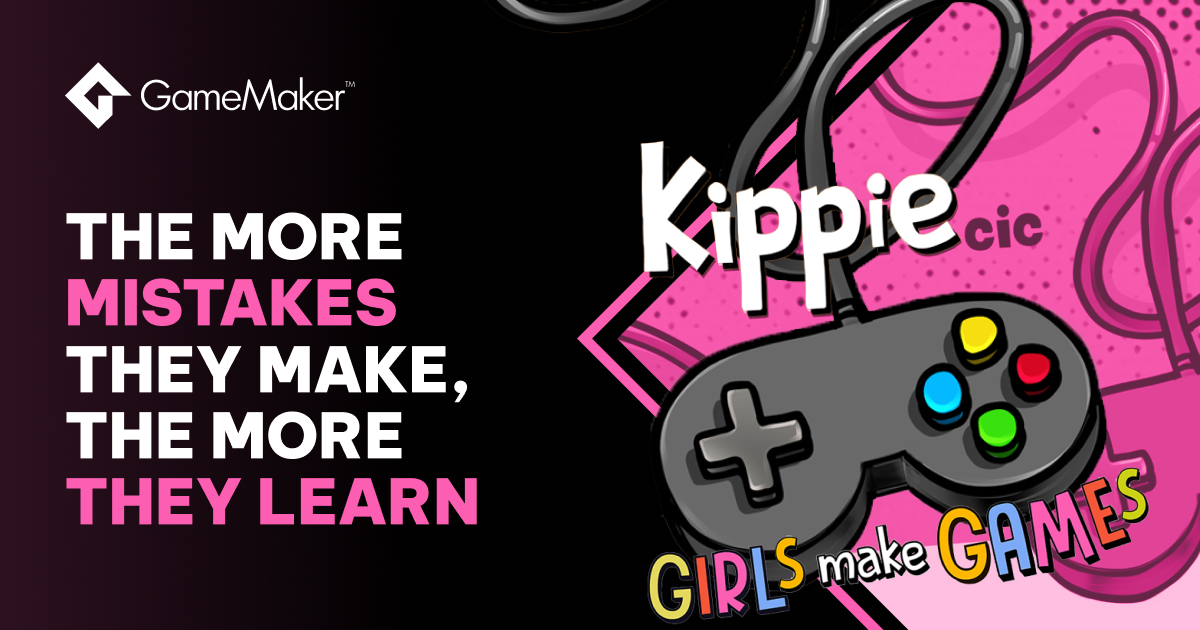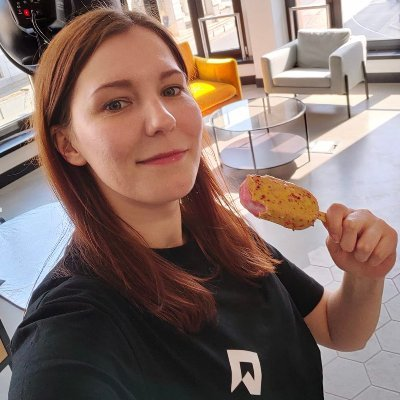Kippie is a company based out of Derry, Northern Ireland, headed by sisters Caroline Anderson and Katherine Rowlandson, together with Katherine’s wife, Justine.
It focuses on helping people from all backgrounds learn how to make games and express themselves in their work.
During our interview we talked about the skills game-making can help children develop, and the lockdown-inspired project they’re working on themselves!
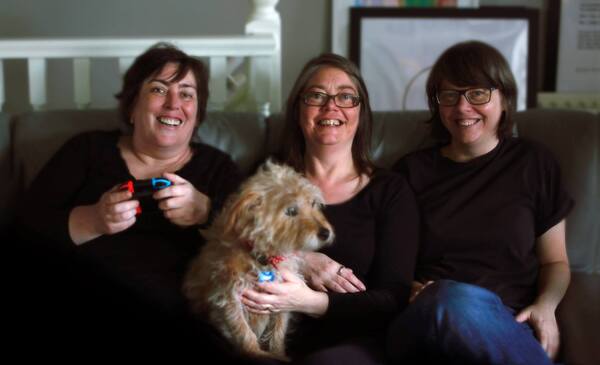
Justine, Caroline and Katherine, the founders of Kippie
How did Kippie come to be?
KR: A few years back, I was working in a dog shelter and my wife was working for a local company, as was Caroline. We started looking around for something fun the three of us could do together.
My wife and I are both dyslexic, and didn't have the easiest time at school. We were interested in people who learn in different ways and don't thrive in the traditional school environment.
A local gallery was doing an exhibition on guano - bird poop - and asked if we could come up with a workshop involving something digital. Together with a group of kids, we made a very simple game where you had a bird flying left and right, occasionally pooping. You were supposed to collect it in your ship and then sell it.
Kids loved this exhibition, they had to be dragged away by their parents who told us they’ve never seen them this interested or excited in anything. It was a light bulb moment, where we understood that nobody else is doing anything like this.
Justine and Caroline were both in full-time jobs at the time, and it was risky to start this new venue, but we decided that if we’d rather do something we’d enjoy.
CA: It took us a while and we were really lucky to have very supportive people around us. Our first pupils were a group of LGBT+ kids who let us practice with them in our workshops.
We had such a great time with them. We were able to build a business case for Kippie and convince people it’s something that might actually work and people are willing to pay for. We also had tremendous support from NI Screen and the social enterprise community in Northern Ireland.
Today we organise workshops for different skill levels, for girls between 10 and 13 in particular. It’s the age group where children are still interested and excited to learn.
As they get older there's more of a stigma for developing games. Our plan is to get in when they're still open to the idea, and then hopefully that passion will continue to carry them through.
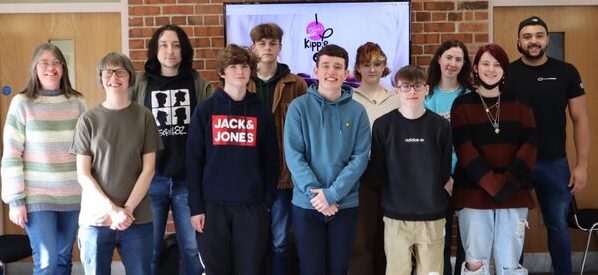
Caroline and Katherine with their students
What is the purpose of Kippie?
KR: Kippie is for the good of everybody who plays games.
Games should be made by everybody, and at the moment we're only experiencing certain people's stories through them, because they’re the ones making all the games. It’s not fair on those minorities, or on society as a whole, since it’s not getting the best content available - only a small part of it.
People don’t realise you can make your own game, so we thought if we could encourage a brighter, broader range of people into game development, that would be better for everybody.
CA: One of the things that’s nice about game development is the option of remote work. You don't have to be in a big city or move abroad for work opportunities. You can stay where you are and support the local economy.
KR: Northern Ireland has a brain drain problem with talented people leaving. They don't see any future here, because there aren't any huge companies or industries here, and so we wanted to show people from Northern Ireland that you don't need much else apart from a laptop and some ideas.
You can create your own business, you can make something entertaining, you can be creative. You don't have to go anywhere else for that.
What kind of activities do you run?
KR: Our main business is workshops: Girls Make Games is the most popular. We run three advancement levels in Derry, and we're starting a few in Belfast now because it's been such a success.
CA: We try to involve other people in our workshops as teachers, especially those who might have difficulty finding employment, to give them more opportunities.
Since 2020, we’ve been teaching at the Video Games Academy run by NI Screen, which is meant for older age groups, from 16 to 19. Recently we've been trying to design a course for primary school kids, focused on telling stories through video games, like in a workbook. We're big on the storytelling side of video games.
We also organise game jams with the help of Into Film, where young people come in with little to no knowledge of video game development, and at the end of the three-day jam, they have a game that we put up on our website.
Aside from that, we do some commercial work, and we’re in the early stages of making our own game independently, which is something we've always wanted to do. We’ve worked on games for others, but not our own.
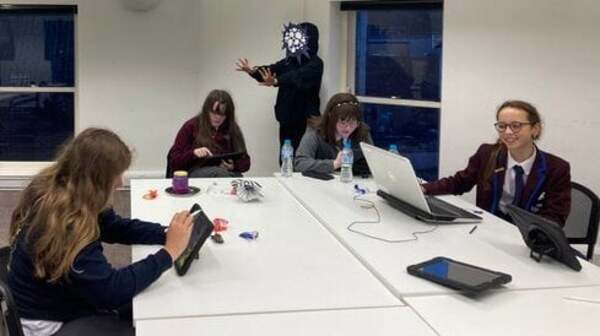
Kippie's pupils during Girls Make Games workshop
Were video games an important part of your upbringing?
KR: When we were growing up, we spent hours working on a Spectrum and coding in Basic. You’d need reams of typing to get it to do something. It was very simple, and Caroline was always really interested in that side of things, but it looked a wee bit too complicated for me.
When we got older, we noticed a gender divide in video games, and we thought it was a real shame, since things didn't feel like that when we were children. Everybody was just really excited about games and there wasn't a split between what girls and boys do.
CA: Our parents never gave us the impression that games or coding weren’t for girls. They always said ‘You can do whatever you want, it doesn't matter’. I think we weren't necessarily as aware of any gender divide as some other people probably were.
I've always liked computers and I always liked programming. I've always been fascinated by the ability to write words and the computer knowing what you mean. It's amazing.
At first I got a degree in English, because I wanted to be a librarian. After that, I did a conversion course to learn about information systems, and when I was doing that, I realised I liked programming much more than books.
I did a year-long course in game development using Game Maker in 2005, which is where I picked it up. I was even chosen with a group of other people to represent Northern Ireland at a game-making competition in Scotland, because I happened to be good at programming.
Is it challenging to support this type of grassroots company?
CA: It is, but much less than in the past, now that we have a lot more support and people are beginning to see Kippie’s potential.
We’ve been doing this since 2017, and back then we faced a lot more pushback. Lots of people asked why we’re doing it in the first place. The truth is that game development professionals don’t have the time to nurture the next generation, so we had to step in.
KR: Everyone now realises that there's a place for Kippie in the industry. Honestly, the amount of support we get is amazing. We're in a really exciting place at the moment.
We got lots of support from Hypixel, which is a big game development company located in Derry, and people are starting to realize making games is a viable career choice.
We were only supposed to do eight weeks of classes one night a week but when we finished up with our first group, the kids wanted to learn more, soe organised an intermediate class, but they just kept going and asking for more!
It results in a bit of a gap when they reach the advanced level; they have nowhere to go next because they're not getting this sort of education in school, though some of them are trying. We organised additional classes for them, because we don’t want to lose that enthusiasm - they’re all set on being game developers!
CA: One of the loveliest things is there's a girl in one of our advanced courses who’s making games with her dad and she’s thriving!
This girl spent ages doing a fantastic animation of a character doing a forward roll and it's a small thing, but she’s done it all on her own in GameMaker and it’s beautiful. Between courses, she'll go home and make her own game and then she'll bring in her USB and put it on for the whole class to play.
It’s amazing to see how much kids can do when you give them these little tools and how then they expand on what you give them.
Some girls went to a Roblox programming camp in London, others did a three-day animation event. Their interest in game development affects what schools their parents choose for them when they're transitioning between primary and secondary school, because they want to make sure their children can express their creative side.
![]()
Katherine and Caroline at Hypixel Studio
What kind of skills can a student learn while making games?
KR: There are so many transferable skills they can acquire: problem solving is the first that comes to mind, and we love to encourage that as well.
During our three-day game jams, we start out with everybody learning 10 different things and then they have to come up with an interesting game using those bits of knowledge. You train their imagination, creativity, problem solving-skills, and teamwork.
CA: They can learn how to do animation and 2D art and everything that comes with programming. A skill that’s not obvious to many people is the ability to research, find answers to your problems, and apply the solution.
The other thing is understanding all the work that goes into game dev. How to storyboard, all the design work at the very beginning, and how you translate that into a game, breaking it all down into the little steps, then the QA testing.
Every one of those skills is transferable to other careers, not just in games.
How can teachers encourage students to learn how to make games?
KR: It’s good to get something going really quickly with immediate feedback. You can get them started on GameMaker, have them fill in a block of color, paint an eye on it and then make it move about the screen within 20 minutes. That always has a huge effect because students get excited to see something's happening, and knowing they did it.
One of our girls said to us that she loves the element of choice we offer. We give our students necessary tools, explain how to use them and then let them do their own thing and make whatever game they want.
It feels like we're giving them a little bit of trust by saying ‘we don’t expect you to finish this the way we want, do it your own way’.
CA: It's very difficult to have the same approach in a school, because lessons have to have an outcome and teachers have to hit milestones.
My son did some classes in GameMaker at secondary school, and there was a lot of reporting, taking a screenshot every two minutes to show how you did something. I know that there has to be an element of that, but it really interferes with creativity, because learners can't just go and focus on making a game.
It doesn't matter if the game looks perfect or not. One of our girls often ends up with half the graphics in her game upside down, but she loves playing with and breaking the software.
KR: We have that atmosphere in the class where if you've managed to get your game to do something completely bonkers that it absolutely was not meant to do, ideally without breaking the laptop, then it’s great! Girls are challenging themselves to find out how this bug was made.
As teachers, we’re not afraid of making mistakes as well. If you program a game on screen, press play and a character shoots off in the wrong direction, it enables the kids to make mistakes, and the more mistakes they make the more they learn, and most importantly, they feel like they're doing it themselves as opposed to you managing them.
CA: The other thing is if you're not really into games yourself, there's a certain element of fear - ‘What am I gonna do? What am I getting into?’. The kids know a lot of stuff that I don't, but they will gladly explain to us because they love talking about anything they’re interested in.
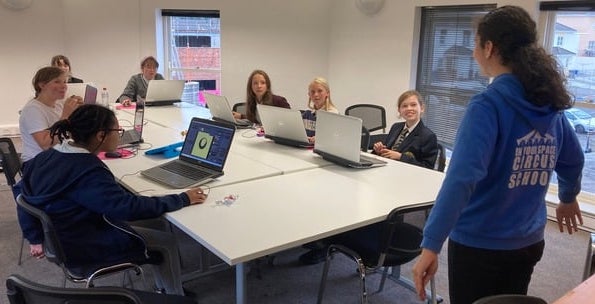
Girls working on the next video game sensation
Why did you choose GameMaker?
CA: I still remember the first game I made, how quickly I got the result and how excited I was when I did it. It’s just so fast! It’s very accessible to learn, but has a lot to offer if you want to put in the time to learn to code.
KR: It’s the breadth of it. If your students want to learn coding, they can go and get into that, whereas the ones who are more interested in things like the level layout, the storytelling, or the graphics can work on those bits in GameMaker Visual as well.
In a matter of days we can put together a whole game with them and upload it to our website so those kids can show their work to their parents.
Are the students finding Kippie themselves or is it mostly their parents signing them up?
KR: We have a lot of kids who maybe don't fit in all that well in school and their parents want to find something that their child will do outside of school that grabs their interest.
If one of their child’s only interests is computer games, they can come here and talk to other kids who love games just as much.
CA: And then they tell their friends or their siblings! With older age groups, they usually decide to take part in our classes themselves.
What can we do to encourage more women, girls and non-binary people to try their hand at game development?
KR: It has a lot to do with visibility of female or non-binary programmers. Many people don't know they exist, and so you're not aware of it as a potential career. Having female and non-binary teachers and role-models is a key.
Sometimes we organise talks with local creatives. We had a female art director from Belfast come by, and our students didn’t even know that you could be an art director in game development.
Media portrayals of programmers are always male hackers sitting in a darkened room somewhere. It's just not an inviting image. History is full of female programmers, but we never hear about them.
CA: Many people think making games is only about programming, and there's a lot of it, but a programmer very rarely will be able to make a game all on their own. Most of them won’t be doing all the art and all the soundworks, you've got to have a team of people.
We need to raise the profile of female and non-binary people in the industry in whatever roles they’re in. There are a lot more than they used to be, it's just a matter of getting them out in front.
You don't necessarily want to be a representative of a woman in games or a role model just because you’re trying to do your job, but we can always try to make people stand out a little bit more and to say that they exist and thrive.
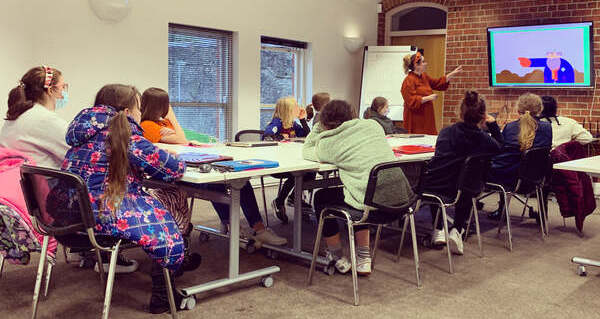
Students engrossed in their game-making class
You mentioned you’re making your own game. What is it about?
CA: It's a dog walking simulator!
KR: It reflects the lockdown when we did nothing but take our dogs for a walk.
CA: The story follows the main character and her dog and all the people that she meets in the park. The relationships she builds up during different seasons affects how things play out.

